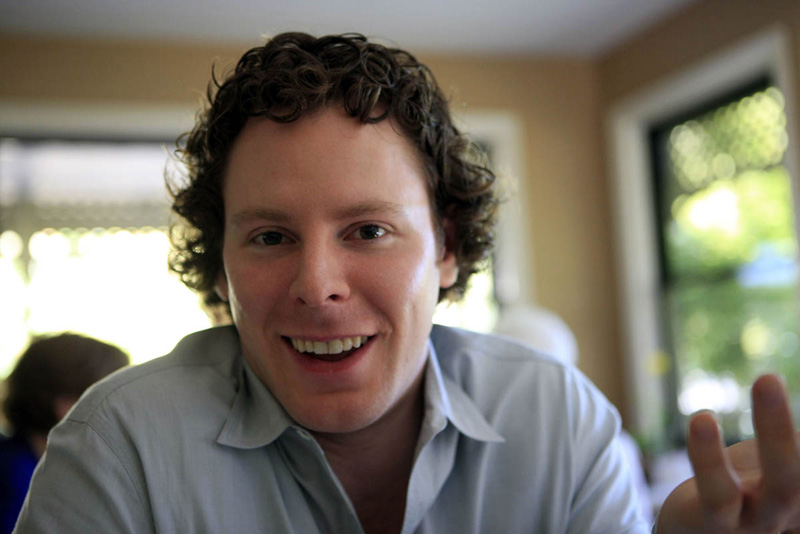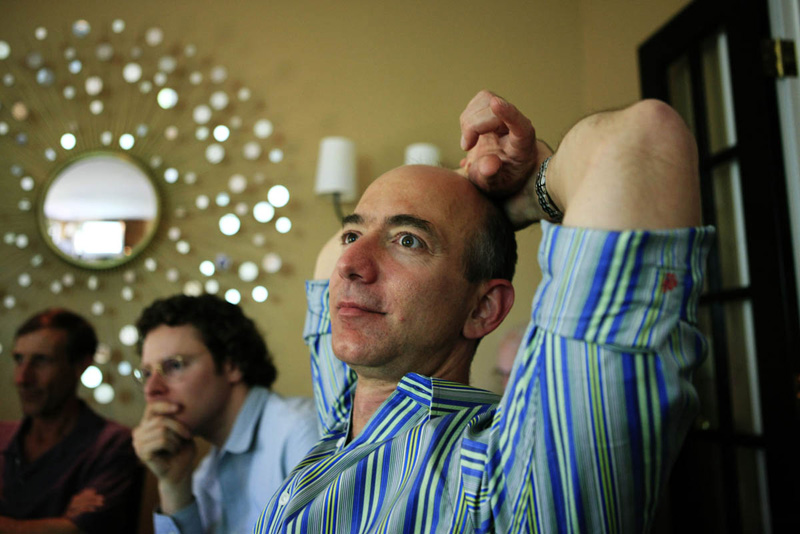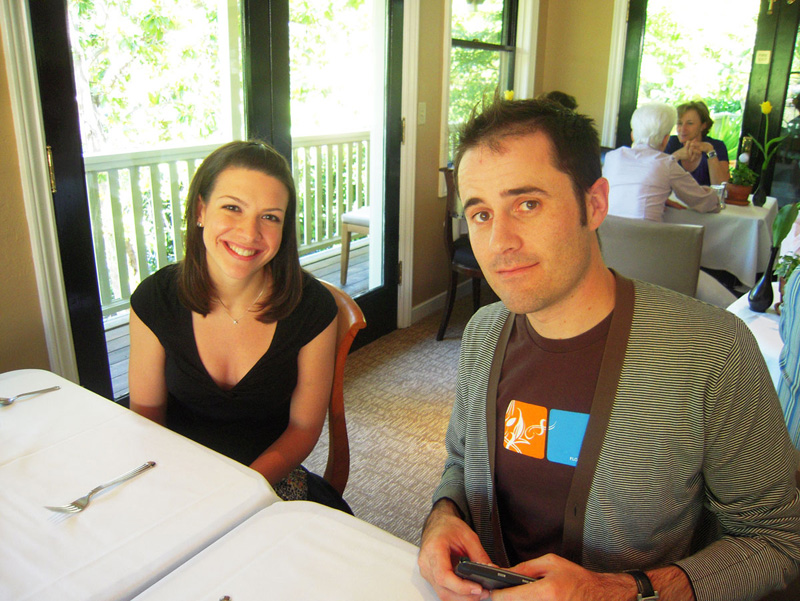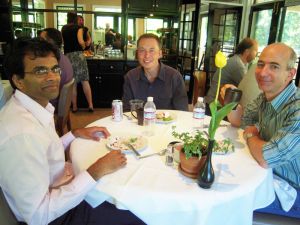Edge Master Classes & Seminars
A Short Course in Superforecasting
With Philip Tetlock
Spring Mountain Vineyard, St. Helena, Napa, CA, July 2015
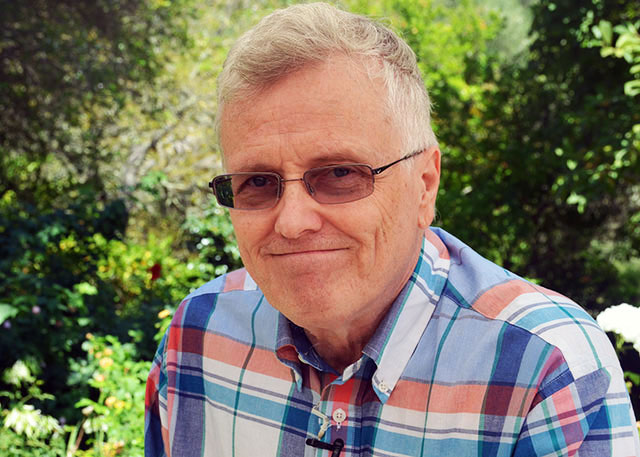
This year, the psychologist and social scientist Philip E. Tetlock presented the findings based on his work on forecasting as part of the Good Judgment Project. In 1984, Tetlock began holding "forecasting tournaments" in which selected candidates were asked questions about the course of events: In the wake of a natural disaster, what policies will be changed in the United States? When will North Korea test nuclear weapons? Candidates examine the questions in teams. They are not necessarily experts, but attentive, shrewd citizens.
Steven Pinker, who has written about Tetlock's work on superforecasting, noted that "Tetlock is one of the very, very best minds in the social sciences today. He has come up with one brilliant idea after another, and superforecasting is no exception. Everyone agrees that the way to know if an idea is right is to see whether it accurately predicts the future. But which ideas, which methods, which people have an actual, provable track record of non-obvious predictions vindicated by the course of events? The answers will surprise you, and have radical implications for politics, policy, journalism, education, and even epistemology—how we can best gain knowledge about the world we live in."
Among Tetlock's "students" at the Edge weekend were many intellectual heavyweights including political scientist and National Medal of Science winner Robert Axelrod; psychologist, Nobel Laureate, and recipient of the 2013 Presidential Medal of Freedom Daniel Kahneman; the political scientist and Director of Stanford’s CASBS Margaret Levi; Google Senior Vice President Salar Kamangar; psychologist and National Medal of Science winner Anne Treisman; Roboticist Rodney Brooks, former head of MIT's Computer Science Lab; W. Daniel Hillis, pioneer in massively parallel computation; medical inventor Dean Kamen; and Peter Lee, Corporate Vice President, Microsoft Research, overseeing MSR NExT.
Over the weekend in Napa, Tetlock held five classes, which are being presented by Edge in their entirety (8.5 hours of video and audio) along with accompanying transcripts (61,000 words).
PHILIP E. TETLOCK, Political and Social Scientist, is the Annenberg University Professor at the University of Pennsylvania, with appointments in Wharton, psychology and political science. He is co-leader of the Good Judgment Project, a multi-year forecasting study, the author of Expert Political Judgment and (with Aaron Belkin) Counterfactual Thought Experiments in World Politics, and co-author (with Dan Gardner) of Superforecasting: The Art & Science of Prediction.
ATTENDEES: Robert Axelrod, Political Scientist; Walgreen Professor for the Study of Human Understanding, U. Michigan; Author, The Evolution of Cooperation; Member, National Academy of Sciences; Recipient, the National Medal of Science; Stewart Brand, Founder, The Whole Earth Catalog; Co-Founder, The Well; Co-Founder, The Long Now Foundation; Author, Whole Earth Discipline; John Brockman, Editor, Edge; Author, The Third Culture; Rodney Brooks, Panasonic Professor of Robotics (emeritus), MIT; Founder, Chmn/CTO, Rethink Robotics; Author, Flesh and Machines; Brian Christian, Philosopher, Computer Scientist, Poet; Author, The Most Human Human; Wael Ghonim, Pro-democracy leader of the Tarir Square demonstrations in Egypt; Anonymous administrator of the Facebook page, "We are all Khaled Saeed"; W. Daniel Hillis, Physicist; Computer Scientist; Chairman, Applied Minds; Author, The Pattern on the Stone; Jennifer Jacquet, Assistant Professor of Environmental Studies, NYU; Author, Is Shame Necessary?; Daniel Kahneman, Professor Emeritus of Psychology, Princeton; Author, Thinking, Fast and Slow; Winner of the 2013 Presidential Medal of Freedom; Recipient of the 2002 Nobel Prize in Economic Sciences; Salar Kamangar, Senior Vice President, Google; Fmr head of YouTube; Dean Kamen, Inventor and Entrepreneur, DEKA Research; Andrian Kreye, Feuilleton Editor, Sueddeutsche Zeitung, Munich; Peter Lee, Corp. VP, Microsoft Research; Former Founder / Director, DARPA's technology office; Former Head, Carnegie Mellon Computer Science Department & CMU's Vice Provost for Research; Margaret Levi, Political Scientist, Director, Center For Advanced Study in Behavioral Sciences (CASBS), Stanford University; Barbara Mellers, Psychologist; George Heyman University Professor at UPennsylvania; Past President, Society of Judgment and Decision Making; Ludwig Siegele, Technology Editor, The Economist; Rory Sutherland, Executive Creative Director and Vice-Chairman, OgilvyOne London; Vice-Chairman, Ogilvy & Mather UK; Columnist, The Spectator; Philip Tetlock, Political and Social Scientist; Annenberg University Professor at UPenn; Author, Expert Political Judgment; and (with Dan Gardner) Superforecasting (forthcoming); Anne Treisman, James S. McDonnell Distinguished University Professor Emeritus of Psychology at Princeton; Recipient, National Medal of Science; D.A.Wallach, Recording Artist; Songwriter; Artist in Residence, Spotify; Hi-Tech Investor
HeadCon '14: What's New in Social Science?
With Sarah-Jayne Blakemore, Molly Crockett, Jennifer Jacquet, Michael McCullough, Hugo Mercier, L.A. Paul, David Rand, Lawrence Ian Reed, Simone Schnall. Also participating: Fiery Cushman, Joshua Knobe, David Pizarro, Laurie Santos
Eastover Farm, Bethlehem, CT, September 2014
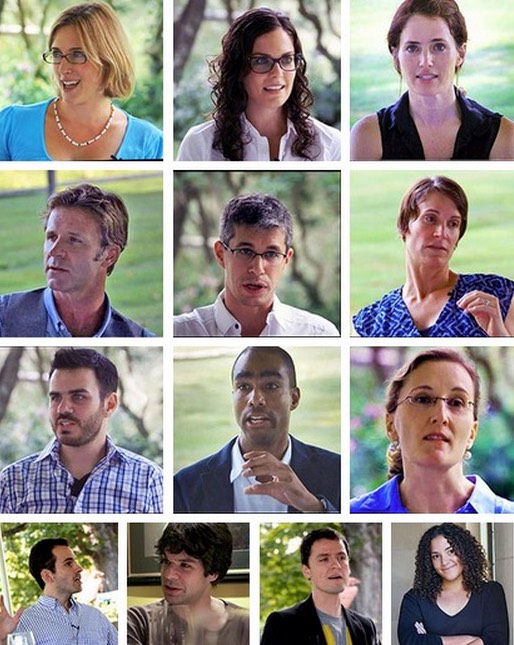
In September a group of social scientists gathered for HEADCON '14, an Edge Conference at Eastover Farm. Speakers addressed a range of topics concerning the social (or moral, or emotional) brain.
PARTICIPANTS: SARAH-JAYNE BLAKEMORE is a Royal Society University Research Fellow and Professor of Cognitive Neuroscience, Institute of Cognitive Neuroscience, University College London.
LAWRENCE IAN REED is a Visiting Assistant Professor of Psychology, Skidmore College.
MOLLY CROCKETT is Associate Professor, Department of Experimental Psychology, University of Oxford; Wellcome Trust Postdoctoral Fellow, Wellcome Trust Centre for Neuroimaging.
HUGO MERCIER, a Cognitive Scientist, is an Ambizione Fellow at the Cognitive Science Center at the University of Neuchâtel.
JENNIFER JACQUET is Assistant Professor of Environmental Studies, NYU; Researching cooperation and the tragedy of the commons; Author, Is Shame Necessary?
SIMONE SCHNALL is a University Senior Lecturer and Director of the Cambridge Embodied Cognition and Emotion Laboratory at Cambridge University.
DAVID RAND is Assistant Professor of Psychology, Economics, and Management at Yale University, and the Director of Yale University's Human Cooperation Laboratory.
L.A. PAUL is Professor of Philosophy at the University of North Carolina at Chapel Hill, and Professorial Fellow in the Arché Research Centre at the University of St. Andrews.
MICHAEL MCCULLOUGH is Director, Evolution and Human Behavior Laboratory, Professor of Psychology, Cooper Fellow, University of Miami; Author, Beyond Revenge.
KIBITZERS: FIERY CUSHMAN is assistant professor in the Department of Psychology at Harvard University; JOSHUA KNOBE is an experimental philosopher and associate professor of philosophy and cognitive science at Yale University; DAVID PIZARRO is associate professor of psychology at Cornell University, specializing in moral judgment. LAURIE SANTOS is associate professor in the Department of Psychology and director of the Comparative Cognition Laboratory at Yale University.
HeadCon '13: What's New in Social Science?
With Sendhil Mullainathan, June Gruber, Fiery Cushman, Rob Kurzban, Nicholas Christakis, Joshua D. Greene, Laurie Santos, Joshua Knobe, David Pizarro, Daniel C. Dennett. Also participating: Jennifer Jacquet, Daniel Kahneman, Anne Treisman
Eastover Farm, Bethlehem, CT, July 2013








In July 2013, Edge invited a group of social scientists to participate in an Edge Seminar at Eastover Farm focusing on the state of the art of what the social sciences have to tell us about human nature. We asked the participants to consider the following questions: "What's new in your field of social science in the last year or two, and why should we care? Why do we want or need to know about it? How does it change our view of human nature?" And in so doing we also asked them to focus broadly and address the major developments in their field (including but not limited to their own research agenda). The goal: to get new, fresh, and original field reports on different areas of social science.
PARTICIPANTS: SENDHIL MULLAINATHAN is professor of economics at Harvard; assistant director for research with the Consumer Financial Protection Bureau (CFPB), U.S. Treasury Department (2011-2013); and Coauthor of Scarcity: Why Having Too Little Means So Much. JUNE GRUBER is assistant professor of psychology and director of the Positive Emotion & Psychopatology Lab at Yale University. FIERY CUSHMAN is assistant professor of Cognitive, Linguistic, and Social Science at Brown University. ROB KURZBAN is an associate professor of psychology at the University of Pennsylvania and author of Why Everyone (Else) Is A Hypocrite. NICHOLAS CHRISTAKIS is a physician and social scientist; director of The Human Nature Lab at Yale University; and coauthor of Connected: The Surprising Power Of Our Social Networks And How They Shape Our Lives. JOSHUA GREENE is the John and Ruth Hazel Associate Professor of the Social Sciences, director of the Moral Cognition Laboratory in the Department of Psychology at Harvard University, and author of Moral Tribes: Emotion, Reason, And The Gap Between Us And Them. LAURIE SANTOS is an associate professor in the Department of Psychology at Yale University and director of the Comparative Cognition Laboratory. JOSHUA KNOBE is an experimental philosopher and associate professor of philosophy and cognitive science at Yale University. DAVID PIZARRO is an associate professor of psychology at Cornell University, specializing in moral judgement. Philosopher DANIEL C. DENNETT is the Austin B. Fletcher Professor of Philosophy and Codirector of the Center for Cognitive Studies at Tufts University, and author of Intuition Pumps.
The Science of Human Nature
With Daniel Kahneman, Martin Nowak, Steven Pinker, Leda Cosmides, Michael Gazzaniga, Elaine Pagels
Spring Mountain Vineyard, St. Helena, Napa, CA, July 15-17, 2011

In July, 2011, Edge held its annual Master Class in Napa, California on the theme: "The Science of Human Nature"; Princeton psychologist Daniel Kahneman on the marvels and the flaws of intuitive thinking; Harvard mathematical biologist Martin Nowak on the evolution of cooperation; Harvard psychologist Steven Pinker on the history of violence; UC-Santa Barbara evolutionary psychologist Leda Cosmides on the architecture of motivation; UC-Santa Barbara neuroscientist Michael Gazzaniga on neuroscience and the law; and Princeton religious historian Elaine Pagels on The Book of Revelation.
MARTIN NOWAK is a mathematical biologist, game theorist, professor of biology and mathematics, and director of the Center for Evolutionary Dynamics, Harvard University. He is the author of SuperCooperators: Altruism, Evolution, and Why We Need Each Other to Succeed.
STEVEN PINKER is Harvard College Professor and Johnstone Family Professor of Psychology at Harvard University, and author of The Language Instinct, How the Mind Works, and The Better Angels Of Our Nature.
LEDA COSMIDES is professor of pPsychology and co-director (with John Tooby) of the Center for Evolutionary Psychology at the University of California, Santa Barbara.
MICHAEL GAZZANIGA is a neuroscientist, professor of psychology, and director of the SAGE Center for the Study of Mind, University of California, Santa Barbara. He is the author of Human: Who's In Charge?.
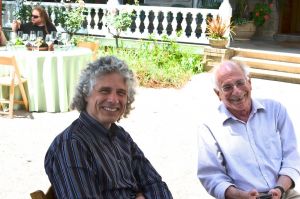 |
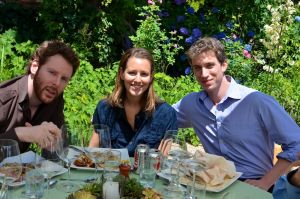 |
| Steven Pinker, Daniel Kahneman | Sean Parker, Jennie Ripps, Max Brockman |
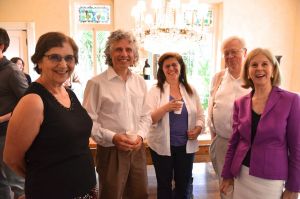 |
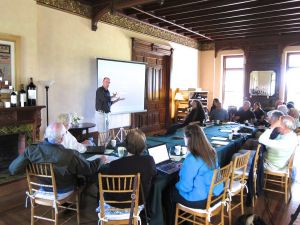 |
| Anne Treisman, Steven Pinker, Leda Cosmides, John Tooby, Elaine Pagels | Martin Nowak class |
The New Science of Morality
With Roy Baumeister, Paul Bloom, Joshua D. Greene, Jonathan Haidt, Sam Harris, Joshua Knobe, Elizabeth Phelps, David Pizarro
The Mayflower Inn, Washington, CT, and Eastover Farm, Bethlehem, CT, July 20-22, 2010

Scientists engaged in the scientific study of human nature are gaining sway over the scientists and others in disciplines that rely on studying social actions and human cultures independent from their biological foundation.
No where is this more apparent than in the field of moral psychology. Using babies, psychopaths, chimpanzees, fMRI scanners, web surveys, agent-based modeling, and ultimatum games, moral psychology has become a major convergence zone for research in the behavioral sciences.
So what do we have to say? Are we moving toward consensus on some points? What are the most pressing questions for the next five years? And what do we have to offer a world in which so many global and national crises are caused or exacerbated by moral failures and moral conflicts? It seems like everyone is studying morality these days, reaching findings that complement each other more often than they clash.
Culture is humankind’s biological strategy, according to Roy F. Baumeister, and so human nature was shaped by an evolutionary process that selected in favor of traits conducive to this new, advanced kind of social life (culture). To him, therefore, studies of brain processes will augment rather than replace other approaches to studying human behavior, and he fears that the widespread neglect of the interpersonal dimension will compromise our understanding of human nature. Morality is ultimately a system of rules that enables groups of people to live together in reasonable harmony. Among other things, culture seeks to replace aggression with morals and laws as the primary means to solve the conflicts that inevitably arise in social life. Baumeister’s work has explored such morally relevant topics as evil, self-control, choice, and free will. [More]
According to Yale psychologist Paul Bloom, humans are born with a hard-wired morality. A deep sense of good and evil is bred in the bone. His research shows that babies and toddlers can judge the goodness and badness of others' actions; they want to reward the good and punish the bad; they act to help those in distress; they feel guilt, shame, pride, and righteous anger. [More]
Harvard cognitive neuroscientist and philosopher Joshua D. Greene sees our biggest social problems — war, terrorism, the destruction of the environment, etc. — arising from our unwitting tendency to apply paleolithic moral thinking (also known as "common sense") to the complex problems of modern life. Our brains trick us into thinking that we have Moral Truth on our side when in fact we don't, and blind us to important truths that our brains were not designed to appreciate. [More]
University of Virginia psychologist Jonathan Haidt's research indicates that morality is a social construction which has evolved out of raw materials provided by five (or more) innate "psychological" foundations: Harm, Fairness, Ingroup, Authority, and Purity. Highly educated liberals generally rely upon and endorse only the first two foundations, whereas people who are more conservative, more religious, or of lower social class usually rely upon and endorse all five foundations. [More]
The failure of science to address questions of meaning, morality, and values, notes neuroscientist Sam Harris, has become the primary justification for religious faith. In doubting our ability to address questions of meaning and morality through rational argument and scientific inquiry, we offer a mandate to religious dogmatism, superstition, and sectarian conflict. The greater the doubt, the greater the impetus to nurture divisive delusions. [More]
A lot of Yale experimental philosopher Joshua Knobe's recent research has been concerned with the impact of people's moral judgments on their intuitions about questions that might initially appear to be entirely independent of morality (questions about intention, causation, etc.). It has often been suggested that people's basic approach to thinking about such questions is best understood as being something like a scientific theory. He has offered a somewhat different view, according to which people's ordinary way of understanding the world is actually infused through and through with moral considerations. He is arguably most widely known for what has come to be called "the Knobe effect" or the "Side-Effect Effect." [More]
NYU psychologist Elizabeth Phelps investigates the brain activity underlying memory and emotion. Much of Phelps' research has focused on the phenomenon of "learned fear," a tendency of animals to fear situations associated with frightening events. Her primary focus has been to understand how human learning and memory are changed by emotion and to investigate the neural systems mediating their interactions. A recent study published in Nature by Phelps and her colleagues, shows how fearful memories can be wiped out for at least a year using a drug-free technique that exploits the way that human brains store and recall memories. [More]
Disgust has been keeping Cornell psychologist David Pizarro particularly busy, as it has been implicated by many as an emotion that plays a large role in many moral judgments. His lab results have shown that an increased tendency to experience disgust (as measured using the Disgust Sensitivity Scale, developed by Jon Haidt and colleagues), is related to political orientation. [More]
Among the members of the press in attendance were: Sharon Begley, Newsweek, Drake Bennett, Ideas, Boston Globe, David Brooks, OpEd Columnist, New York Times, Daniel Engber, Slate, Amanda Gefter, Opinion Editor, New Scientist, Jordan Mejias, Frankfurter Allgemeine Zeitung, Gary Stix, Scientific American, Pamela Weintraub, Discover Magazine.
"Cancering"
With W. Daniel Hillis
Spring Mountain Vineyard, St. Helena, Napa, CA, August 8-9, 2010

The leaders of the National Cancer Institute are very keenly aware of how little progress has actually been made in the treatment of cancer. This is something they pay a lot of attention to. They're thinking very laterally in giving funding to people like me to work on cancer.
"What they've said is 'Let's bring some new kinds of thinking to this, and create a program where we have physical scientists be the principle investigators, partnered with the co-investigators who are clinicians and biological scientists.' I'm partnering with David Agus, for example. But giving money to the physical scientist is a pretty radical idea, you can imagine it is very controversial within the biological community.
"NCI has started a few of these centers, and given them five years to work. They need to be interdisciplinary and geographically distributed. Our center at USC has people all over the United States involved in it, like Cold Spring Harbor, Stanford, Arizona, UT, NYU and CalTech."
W. DANIEL ("DANNY") HILLIS is chairman and chief technology officer of Applied Minds, a research and development company creating a range of new products and services in software, entertainment, electronics, biotechnology and mechanical design. Hillis is also Judge Widney Professor of Engineering and Medicine of the University of Southern California (USC), professor of research medicine at the Keck School of Medicine, and research professor of engineering at the Viterbi School of Engineering. Previously, Hillis was Vice President, Research and Development at Walt Disney Imagineering, and Disney Fellow. He developed new technologies and business strategies for Disney's theme parks, television, motion pictures, Internet and consumer products businesses.
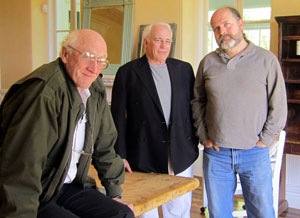
Stewart Brand, John Brockman, Daniel Hillis
A Short Course on Synthetic Genomics
With George Church, J. Craig Venter
SpaceX & The Andaz Hotel, Los Angeles, CA, July 24-26, 2009
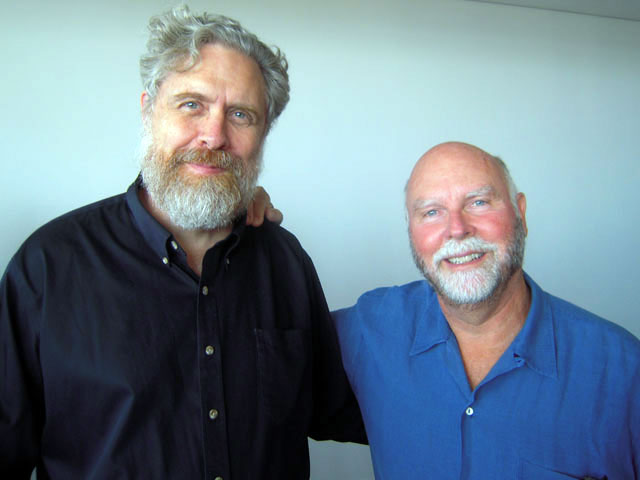
George Church & Craig Venter
On July 24, 2009, a small group of scientists, entrepreneurs, cultural impresarios, and journalists, which included architects of some of the leading transformative companies of our time (Microsoft, Google, Facebook, PayPal), arrived at the Andaz Hotel on Sunset Boulevard in West Hollywood, to be offered a glimpse, guided by George Church and Craig Venter, of a future far stranger than Mr. Huxley had been able to imagine in 1948.
In this future—whose underpinnings, as Drs. Church and Venter demonstrated, are here already—life as we know it is transformed not by the error catastrophe of radiation damage to our genetic processes, but by the far greater upheaval caused by discovering how to read genetic sequences directly into computers, where the code can be replicated exactly, manipulated freely, and translated back into living organisms by writing the other way. "We can program these cells as if they were an extension of the computer," George Church announced, and proceeded to explain just how much progress has already been made. ...
— George Dyson, from The Introduction

GEORGE CHURCH is professor of Genetics, Harvard University; director, Personal Genome Project.
J. CRAIG VENTER is a leading scientist of the 21st century for Genomic Sciences; co-founder, chairman, Synthetic Genomics, Inc.; founder, J. Craig Venter Institute; author, A Life Decoded.
PARTICIPANTS: Stewart Brand, Biologist, Long Now Foundation; Whole Earth Discipline; Larry Brilliant, M.D. Epidemiologist, Skoll Urgent Threats Fund; John Brockman, Publisher & Editor, Edge; Max Brockman, Literary Agent, Brockman, Inc.; What's Next: Dispatches on the Future of Science; Jason Calacanis, Internet Entrepreneur, Mahalo; George Dyson, Science Historian; Darwin Among the Machines; Jesse Dylan, Film-Maker, Form.tv, FreeForm.tv; Arie Emanuel, William Morris Endeavor Entertainment; Sam Harris, Neuroscientist, UCLA; The End of Faith; W. Daniel Hillis, Computer Scientist, Applied Minds; Pattern On The Stone; Thomas Kalil, Deputy Director for Policy for the White House Office of Science and Technology Policy and Senior Advisor for Science, Technology and Innovation for the National Economic Council; Salar Kamangar, Vice President, Product Management, Google; Lawrence Krauss, Physicist, Origins Initiative, ASU; Hiding In The Mirror; John Markoff, Journalist,The New York Times; What The Dormouse Said; Katinka Matson, Cofounder, Edge; Artist, katinkamatson.com; Elon Musk, Physicist, SpaceX, Tesla Motors; Nathan Myhrvold, Physicist, CEO, Intellectual Ventures, LLC, The Road Ahead; Tim O'Reilly, Founder, O'Reilly Media, O'Reilly Radar; Larry Page, CoFounder, Google; Lucy Page Southworth,Biomedical Informatics Researcher, Stanford; Sean Parker,The Founders Fund; CoFounder Napster & Facebook; Ryan Phelan,Founder, DNA Direct; Nick Pritzker, Hyatt Development Corporation; Ed Regis, Writer; What Is Life; Terrence Sejnowski, Computational Neurobiologist, Salk; The Computational Brain; Maria Spiropulu,Physicist, Cern & Caltech; Victoria Stodden, Computational Legal Scholar, Yale Law School; Richard Thaler, Behavioral Economist, U. Chicago; Nudge; Craig Venter, Genomics Researcher; CEO, Synthetic Genomics, A Life Decoded; Nathan Wolfe, Biologist, Global Virus Forecasting Initiative; Alexandra Zukerman, Assistant Editor, Edge
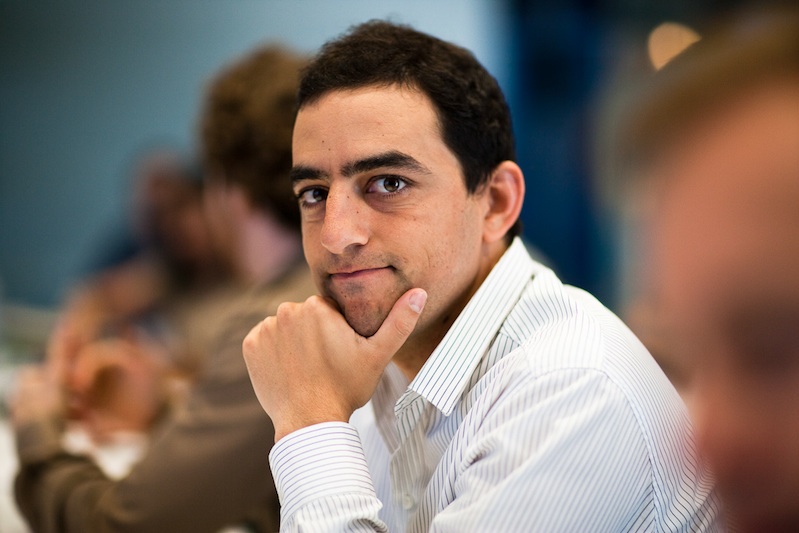 |
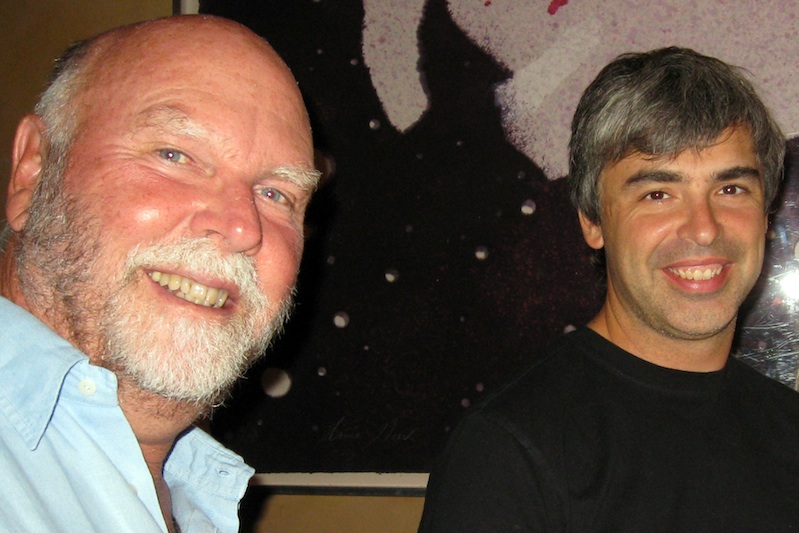 |
| Salar Kamangar | Craig Venter, Larry Page |
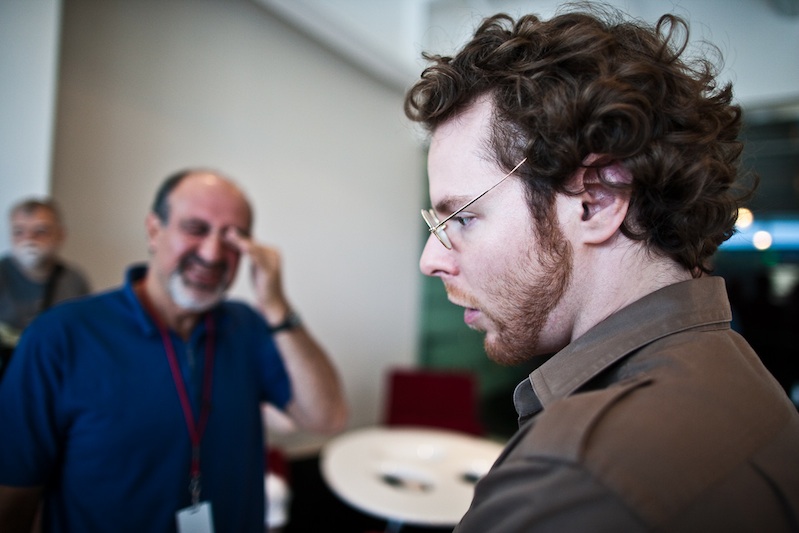 |
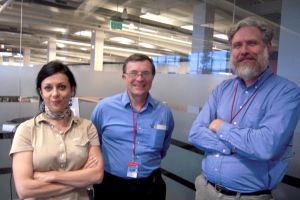 |
| Sean Parker, Facebook | Maria Spiropulu, Terrence Sejnowski, George Church |
A Short Course in Behavioral Economics
With Richard Thaler, Sendhil Mullainathan, Daniel Kahneman
The Gaige House, Sonoma, CA July 25-27, 2008
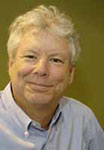 |
 |
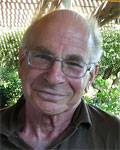 |
| Richard Thaler | Sendhil Mullainathan | Daniel Kahneman |
A year ago, Edge convened its first "Master Class" in Napa, California, in which psychologist and Nobel Laureate Daniel Kahneman taught a 9-hour course: "A Short Course On Thinking About Thinking." The attendees were a "who's who" of the new global business culture.
The following year, in 2008, we invited Richard Thaler, the father of behavioral economics, to continue the conversation by organizing and leading the class: "A Short Course On Behavioral Economics."
Thaler arrived at Stanford in the 1970s to work with Kahneman and his late partner, Amos Tversky. Thaler, in turn, asked Harvard economist and former student Sendhil Mullainathan, as well as Kahneman, to teach the class with him.
RICHARD H. THALER is the father of Behavioral Economics; Director, Center for Decision Research, University of Chicago Graduate School of Business; Co-author, Nudge
SENDHIL MULLAINATHAN is a professor of Economics, Harvard; Assistant Director for Research, The Consumer Financial Protection Bureau (CFPB), U.S. Treasury Department (2011-2013); Co-author, Scarcity: Why Having Too Little Means So Much
DANIEL KAHNEMAN is a recipient of the Nobel Prize in Economics, 2002; Eugene Higgins Professor of Psychology, Princeton University; Author, Thinking, Fast and Slow
PARTICIPANTS: Jeff Bezos, Founder, Amazon.com; John Brockman, Edge Foundation, Inc.; Max Brockman, Brockman, Inc.; George Dyson, Science Historian; Author, Darwin Among the Machines; W. Daniel Hillis, Computer Scientist; Cofounder, Applied Minds; Author, The Pattern on the Stone; Daniel Kahneman, Psychologist; Nobel Laureate, Princeton University; Salar Kamangar, Google; France LeClerc, Marketing Professor; Katinka Matson, Edge Foundation, Inc.; Sendhil Mullainathan, Professor of Economics, Harvard University; Executive Director, Ideas 42, Institute of Quantitative Social Science; Elon Musk, Physicist; Founder, Tesla Motors, SpaceX; Nathan Myhrvold, Physicist; Founder, Intellectual Venture, LLC; Event Photographer; Sean Parker, The Founders Fund; Cofounder: Napster, Plaxo, Facebook; Paul Romer, Economist, Stanford; Richard Thaler, Behavioral Economist, Director of the Center for Decision Research, University of Chicago Graduate School of Business; coauthor of Nudge; Anne Treisman, Psychologist, Princeton University; Evan Williams, Founder, Blogger, Twitter.
Life: What a Concept!
With Freeman Dyson, J. Craig Venter, George Church, Robert Shapiro, Dimitar Sasselov, Seth Lloyd
Eastover Farm, Bethlehem, CT, August 27, 2007

Dimitar Sasselov, Max Brockman, Seth Lloyd, George Church,
J. Craig Venter, Freeman Dyson
This year's Annual Edge Event took place at Eastover Farm in Bethlehem, CT, on Monday, August 27th. Invited to address the topic "Life: What a Concept!" were Freeman Dyson, J. Craig Venter, George Church, Robert Shapiro, Dimitar Sasselov, and Seth Lloyd, who focused on their new, and in more than a few cases, startling research, and/or ideas in the biological sciences.
Physicist Freeman Dyson envisions a biotech future which supplants physics and notes that after three billion years, the Darwinian interlude is over. He refers to an interlude between two periods of horizontal gene transfer, a subject explored in his abovementioned essay.
Craig Venter, who decoded the human genome, surprised the world in late June by announcing the results of his lab's work on genome transplantation methods that allows for the transformation of one type of bacteria into another, dictated by the transplanted chromosome. In other words, one species becomes another.
George Church, the pioneer of the synthetic biology revolution, thinks of the cell as operating system, and engineers taking the place of traditional biologists in retooling stripped down components of cells (bio-bricks) in much the vein as in the late 70s when electrical engineers were working their way to the first personal computer by assembling circuit boards, hard drives, monitors, etc.
Biologist Robert Shapiro disagrees with scientists who believe that an extreme stroke of luck was needed to get life started in a non-living environment. He favors the idea that life arose through the normal operation of the laws of physics and chemistry. If he is right, then life may be widespread in the cosmos.
Dimitar Sasselov, planetary astrophysicist, and director of the Harvard Origins of Life Initiative, has made recent discoveries of exo-planets ("Super-Earths"). He looks at new evidence to explore the question of how chemical systems become living systems.
Quantum engineer Seth Lloyd sees the universe as an information processing system in which simple systems such as atoms and molecules must necessarily give rise complex structures such as life, and life itself must give rise to even greater complexity, such as human beings, societies, and whatever comes next.
PARTICIPANTS: In addition to the above, a small group of journalists interested in the kind of issues that are explored on Edge were present: Corey Powell, Discover, Jordan Mejias, Frankfurter Allgemeine Zeitung, Heidi Ledford, Nature, Greg Huang, New Scientist, Deborah Treisman, New Yorker, Edward Rothstein, The New York Times, Andrian Kreye, Süddeutsche Zeitung, Antonio Regalado, Wall Street Journal. Guests included Heather Kowalski, The J. Craig Venter Institute, Ting Wu, The Wu Lab, Harvard Medical School, and the artist Stephanie Rudloe. Attending for Edge: Katinka Matson, Russell Weinberger, Max Brockman, and Karla Taylor.
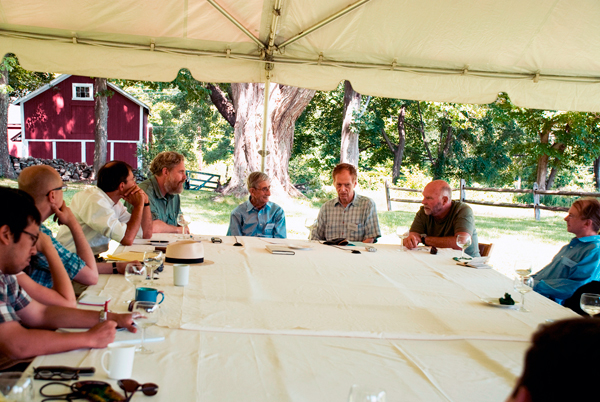
A Short Course in Thinking About Thinking
With Daniel Kahneman
Auberge du Soleil, Rutherford, CA, July 20-22, 2007
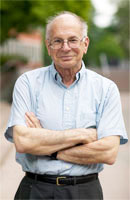

DANIEL KAHNEMAN is a recipient of the Nobel Prize in Economics, 2002; Eugene Higgins Professor of Psychology, Princeton University; Author, Thinking, Fast and Slow

ATTENDEES: Jeff Bezos, Founder, Amazon.com; Stewart Brand, Cofounder, Long Now Foundation, Author, How Buildings Learn; Sergey Brin, Founder, Google; John Brockman, Edge Foundation, Inc.; Max Brockman, Brockman, Inc.; Peter Diamandis, Space Entrepreneur, Founder, X Prize Foundation; George Dyson, Science Historian; Author, Darwin Among the Machines; W. Daniel Hillis, Computer Scientist; Cofounder, Applied Minds; Author, The Pattern on the Stone; Daniel Kahneman, Psychologist; Nobel Laureate, Princeton University; Dean Kamen, Inventor, Deka Research; Salar Kamangar, Google; Seth Lloyd, Quantum Physicist, MIT, Author, Programming The Universe; Katinka Matson, Cofounder, Edge Foundation, Inc.; Nathan Myhrvold, Physicist; Founder, Intellectual Venture, LLC; Event Photographer; Tim O'Reilly, Founder, O'Reilly Media; Larry Page, Founder, Google; George Smoot, Physicist, Nobel Laureate, Berkeley, Coauthor, Wrinkles In Time; Anne Treisman, Psychologist, Princeton University; Jimmy Wales, Founder, Chair, Wikimedia Foundation (Wikipedia).
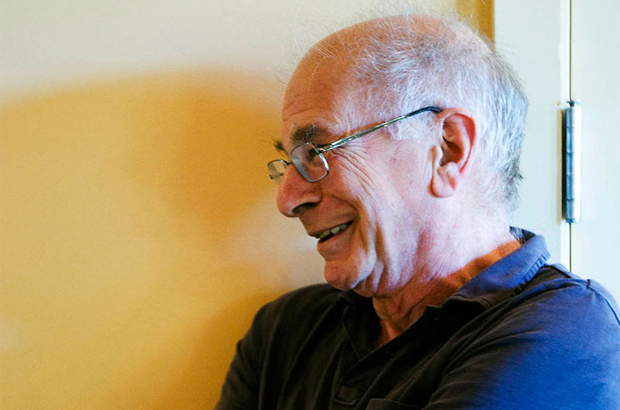 |
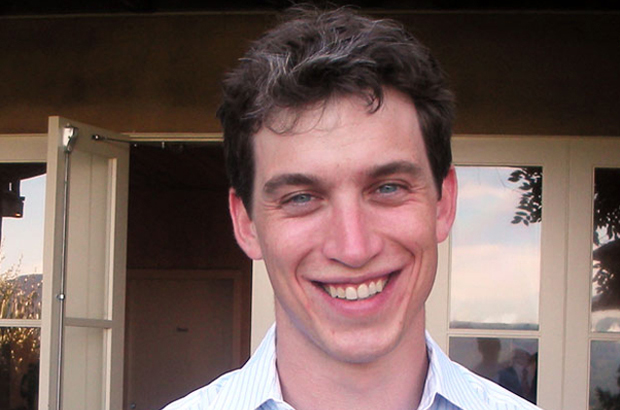 |
| Daniel Kahneman | Max Brockman |
 |
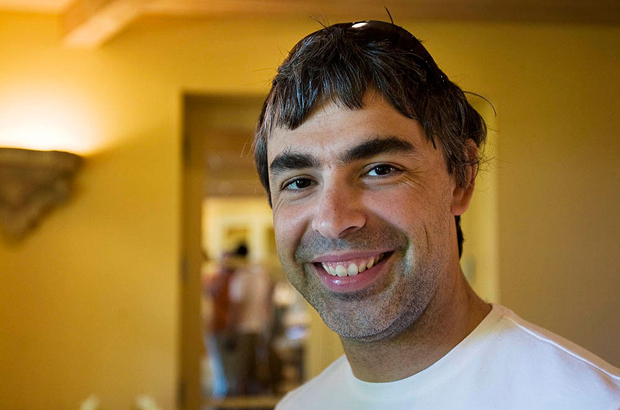 |
| George Dyson | Larry Page |
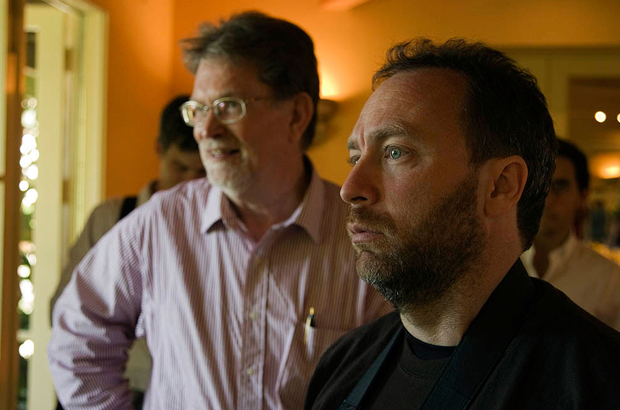 |
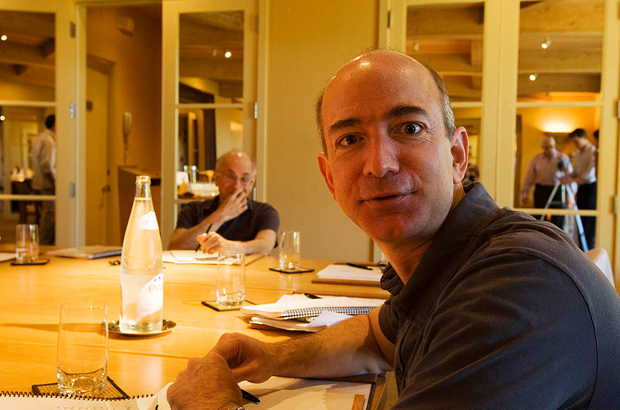 |
| George Smoot, Jimmy Wales | Jeff Bezos |
With Seth Lloyd, Paul Steinhardt, Alan Guth, Marvin Minsky, and Ray Kurzweil
Eastover Farm, Bethlehem, CT, September 2002
What's happening in these new scientific endeavors is truly a work in progress. A year ago, at the first REBOOTING CIVILIZATION meeting in July, 2001, physicists Alan Guth and Brian Greene, computer scientists David Gelernter, Jaron Lanier, and Jordan Pollack, and research psychologist Marc D. Hauser could not reach a consensus about exactly what computation is, when it is useful, when it is inappropriate, and what it reveals. Reporting on the event in The New York Times ("Time of Growing Pains for Information Age", August 7, 2001), Dennis Overbye wrote: On July 21, Edge held an event at Eastover Farm which included the physicists Seth Lloyd, Paul Steinhardt, and Alan Guth, computer scientist Marvin Minsky, and technologist Ray Kurzweil. This year, I noted there are a lot of "universes" floating around. Seth Lloyd: the computational universe (or, if you prefer, the it and bit-itty bitty-universe); Paul Steinhardt: the cyclic universe; Alan Guth: the inflationary universe; Marvin Minsky: the emotion universe, Ray Kurzweil: the intelligent universe. I asked each of the speakers to comment on their "universe". All, to some degree, were concerned with information processing and computation as central metaphors. See below for their links to their talks and streaming video.??Concepts of information and computation have infiltrated a wide range of sciences, from physics and cosmology, to cognitive psychology, to evolutionary biology, to genetic engineering. Such innovations as the binary code, the bit, and the algorithm have been applied in ways that reach far beyond the programming of computers, and are being used to understand such mysteries as the origins of the universe, the operation of the human body, and the working of the mind. ?
Mr. Brockman said he had been inspired to gather the group by a conversation with Dr. Seth Lloyd, a professor of mechanical engineering and quantum computing expert at M.I.T. Mr. Brockman recently posted Dr. Lloyd's statement on his Web site, www.edge.org: "Of course, one way of thinking about all of life and civilization," Dr. Lloyd said, "is as being about how the world registers and processes information. Certainly that's what sex is about; that's what history is about.
Humans have always tended to try to envision the world and themselves in terms of the latest technology. In the 17th and 18th centuries, for example, workings of the cosmos were thought of as the workings of a clock, and the building of clockwork automata was fashionable. But not everybody in the world of computers and science agrees with Dr. Lloyd that the computation metaphor is ready for prime time.
Several of the people gathered under the maple tree had come in the hopes of debating that issue with Dr. Lloyd, but he could not attend at the last moment. Others were drawn by what Dr. Greene called "the glimmer of a unified language" in which to talk about physics, biology, neuroscience and other realms of thought. What happened instead was an illustration of how hard it is to define a revolution from the inside.
Indeed, exactly what computation and information are continue to be subjects of intense debate. But less than a year later, in the "Week In Review" section of the Sunday New York Times ("What's So New In A Newfangled Science?", June 16, 2002) George Johnson wrote about "a movement some call digital physics or digital philosophy — a worldview that has been slowly developing for 20 years."...
Just last week, a professor at the Massachusetts Institute of Technology named Seth Lloyd published a paper in Physical Review Letters estimating how many calculations the universe could have performed since the Big Bang — 10^120 operations on 10^90 bits of data, putting the mightiest supercomputer to shame. This grand computation essentially consists of subatomic particles ricocheting off one another and "calculating" where to go.
As the researcher Tommaso Toffoli mused back in 1984, "In a sense, nature has been continually computing the `next state' of the universe for billions of years; all we have to do — and, actually, all we can do — is `hitch a ride' on this huge ongoing computation."
This may seem like an odd way to think about cosmology. But some scientists find it no weirder than imagining that particles dutifully obey ethereal equations expressing the laws of physics. Last year Dr. Lloyd created a stir on Edge.org, a Web site devoted to discussions of cutting edge science, when he proposed "Lloyd's hypothesis": "Everything that's worth understanding about a complex system can be understood in terms of how it processes information."*....
[*See "Seth Lloyd: How Fast, How Small, and How Powerful: Moore's Law and the Ultimate Laptop"]
Dr, Lloyd did indeed cause a stir when his ideas were presented on Edge in 2001, but George Johnson's recent New York Times piece caused an even greater stir, as Edge received over half a million unique visits the following week, a strong confirmation that something is indeed happening here. (Usual Edge readership is about 60,000 unique visitors a month). There is no longer any doubt that the metaphors of information processing and computation are at the center of today's intellectual action. A new and unified language of science is beginning to emerge.
With Marc D. Hauser, Lee Smolin, Brian Greene, Jaron Lanier, Jordan Pollack, David Gelernter, Alan Guth
Eastover Farm, Bethlehem, CT, September 2002
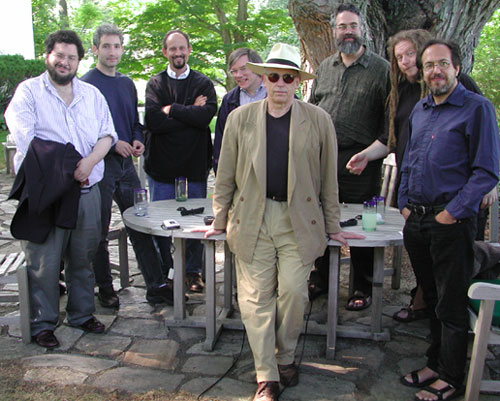
Software and computation are reinventing the civilized world —"rebooting civilization," in the words of David Gelernter. "It's a software-first world," notes Stanford AI expert Edward Feigenbaum, chief scientist of the U.S. Air Force in the mid-nineties. "It's not a mistake that the world's two richest men are pure software plays. Or that the most advanced fighter planes in the U.S. Air Force are bundles of software wrapped in aluminum shells, or that the most advanced bomber is run by computers and cannot be flown manually". Everybody in business today is in the software business. But what comes after software?
Experimental psychologist Steven Pinker speaks of "a new understanding that the human mind is a remarkably complex processor of information." To Pinker, our minds are "organs of computation." To philosopher Daniel C. Dennett, "the basic idea of computation, as formulated by the mathematicians John von Neumann and Alan Turing, is in a class by itself as a breakthrough idea." Dennett asks us to think about the idea that what we have in our heads is software, "a virtual machine, in the same way that a word processor is a virtual machine." Pinker and Dennett are talking about our mental life in terms of the idea of computation, not simply proposing the digital computer as a metaphor for the mind. Other scientists such as physicist Freeman Dyson disagree , but most recognize that these are big questions.??Physicist David Deutsch, a pioneer in the development of the quantum computer, points out that "the chances are that the technological implications of quantum computers, though large by some standards, are never going to be the really important thing about them. The really important thing is the philosophical implications, epistemological and metaphysical. The largest implication, from my point of view, is the one that we get right from the beginning, even before we build the first quantum computer, before we build the first cubit. The very theory of quantum computers already forces upon us a view of physical reality as a multiverse."??Computer scientist and AI researcher Rodney Brooks is puzzled that "we've got all these biological metaphors that we're playing around with — artificial immunology systems, building robots that appear lifelike — but none of them come close to real biological systems in robustness and in performance. They look a little like it, but they're not really like biological systems." Brooks worries that in looking at biological systems we are missing something that is already there — that has always been there. To Brooks, this might be called "the essence of life," but he is talking about a biochemical phenomenon, not a metaphysical one. Brooks is searching for a new conceptual framework that, like computation, does not involve any new physics or chemistry — a framework that gives us a different way of thinking about the stuff that's there. "We see the biological systems, we see how they operate," he says, "but we don't have the right explanatory modes to explain what's going on and therefore we can't reproduce all these sorts of biological processes. That to me right now is the deep question."
One aspect of our culture that is no longer open to question is that the most signigicant developments in the sciences today (i.e. the developments that affect the lives of everybody on the planet) are about, informed by, or implemented through advances in software and computation.
This Edge event is an opportunity for people in various fields such as computer science, cosmology, cognition, evolutionary biology, etc., to begin talking to each other, to become aware of interesting and important work in other fields.


